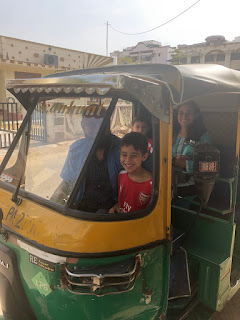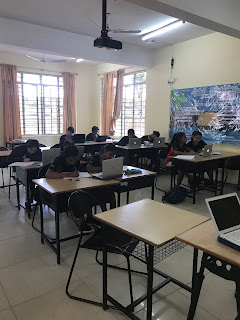Slow and Steady...
Fridays are the days I go to my kids school, Indus International and shadow my mentor teacher. I am really interested in looking at student-centered learning and how this kind of learning is embedded in their curriculum. Today, I started to understand the politics of the school and the impact of India's educational policies. They too have an exam in the 10th grade that is called the Secondary School Certificate (SSC). SSC is a matriculation examination and is a public examination in Bangladesh, India and Pakistan conducted by educational boards. Additionally, parents decide on their child's school based on curriculums which are set by boards. Each board decides the curriculum.
There are 4 main boards in India which are:
1. CBSE (Central Board of Secondary Education)-The syllabus is structured, predictable and controlled, which makes it extremely useful since all national entrance examinations are conducted as per this syllabus. Especially useful if the child wants to become an engineer or doctor.
2. ICSE (Indian Certificate of Secondary Education)-It provides more choice, flexibility and freedom to students vis-a-vis subject choice. ICSE provides equal focus to both art and science.
3. IB (International Baccalaureate)-Innovative pedagogy and curriculum, which makes learning more fun and stress-free. It is a different learning experience altogether, which does not promote rote-learning amongst students. IB syllabus is accepted world-wide, which gives an edge to students who wish to go abroad for further studies.
4. State Boards-Topics and content is more locally-relevant, which is helpful for students who wish to take state public service commission examinations. Moderately-loaded curriculum leaves ample time for students to explore more extracurricular activities.
The school I am a participating observer in is an IB school. And they too have a hard time implementing student-centered learning activities such as the design thinking process. It was so incredible to just and sit and talk to my mentor teacher about the struggle to move from focusing on these tests to igniting student learning.There seems to be this disbelief that this kind of learning will yield the same positive results on the exams. Finally, I was able to have a break through and have a real conversation about this work and student engagement in learning! Progress made!
P.S. A note about my knee: Thank you for all of you who have reached out, I appreciate the kind words and good wishes. Here is my outlook. We have moved to India for 6 months and are truly living here in every sense. We have completely immersed ourselves here as if we are going to settle here for several years. I am operating the way I would at home when something happens to me. I use the "wait and see method". Over 2 weeks it has gotten better but my knee has not fully recovered, so I went to see the doctor and got an MRI. Just as I would back home. Now, I am just waiting to see what he says and what he suggests. I will take a second opinion from my doctor at home and from my sister. And then we will plan accordingly. I am managing the injury exactly the same way I would as if I was at home. The only difference is that I had to figured out the health care system in India. I had a moment of frustration and anger and then rationalized with John all the different scenarios just as if we were at home in Dedham. Now, we just have to wait and see what the doctor has to say. I will keep you posted.
There are 4 main boards in India which are:
1. CBSE (Central Board of Secondary Education)-The syllabus is structured, predictable and controlled, which makes it extremely useful since all national entrance examinations are conducted as per this syllabus. Especially useful if the child wants to become an engineer or doctor.
2. ICSE (Indian Certificate of Secondary Education)-It provides more choice, flexibility and freedom to students vis-a-vis subject choice. ICSE provides equal focus to both art and science.
3. IB (International Baccalaureate)-Innovative pedagogy and curriculum, which makes learning more fun and stress-free. It is a different learning experience altogether, which does not promote rote-learning amongst students. IB syllabus is accepted world-wide, which gives an edge to students who wish to go abroad for further studies.
4. State Boards-Topics and content is more locally-relevant, which is helpful for students who wish to take state public service commission examinations. Moderately-loaded curriculum leaves ample time for students to explore more extracurricular activities.
The school I am a participating observer in is an IB school. And they too have a hard time implementing student-centered learning activities such as the design thinking process. It was so incredible to just and sit and talk to my mentor teacher about the struggle to move from focusing on these tests to igniting student learning.There seems to be this disbelief that this kind of learning will yield the same positive results on the exams. Finally, I was able to have a break through and have a real conversation about this work and student engagement in learning! Progress made!
 |
| IB Model for the Middle School at Indus |
P.S. A note about my knee: Thank you for all of you who have reached out, I appreciate the kind words and good wishes. Here is my outlook. We have moved to India for 6 months and are truly living here in every sense. We have completely immersed ourselves here as if we are going to settle here for several years. I am operating the way I would at home when something happens to me. I use the "wait and see method". Over 2 weeks it has gotten better but my knee has not fully recovered, so I went to see the doctor and got an MRI. Just as I would back home. Now, I am just waiting to see what he says and what he suggests. I will take a second opinion from my doctor at home and from my sister. And then we will plan accordingly. I am managing the injury exactly the same way I would as if I was at home. The only difference is that I had to figured out the health care system in India. I had a moment of frustration and anger and then rationalized with John all the different scenarios just as if we were at home in Dedham. Now, we just have to wait and see what the doctor has to say. I will keep you posted.
 |
| Reflection Flower |



Comments
Post a Comment